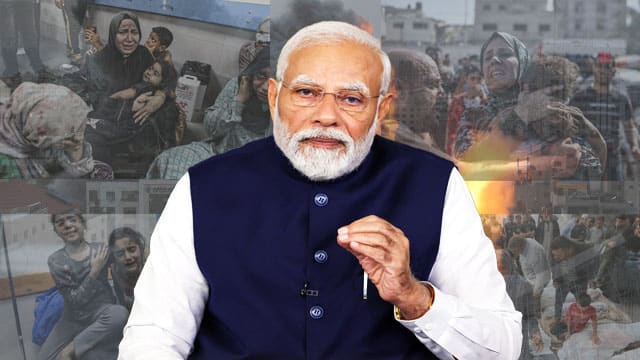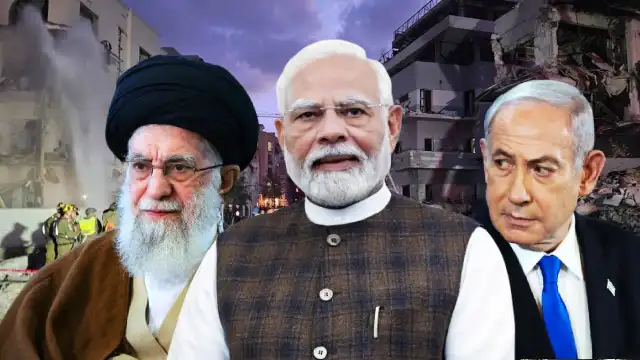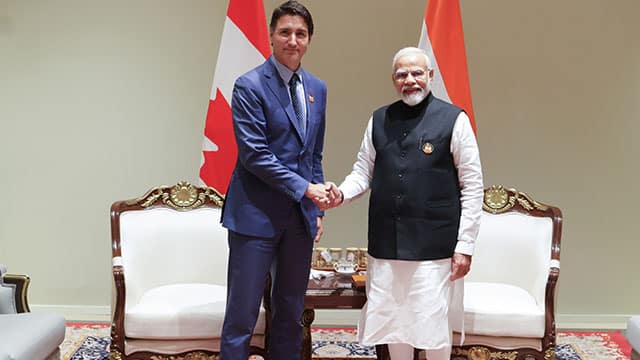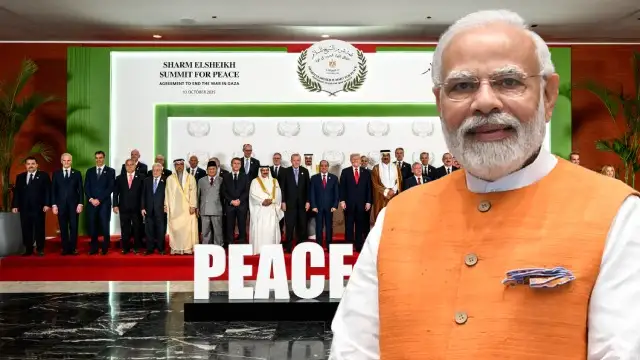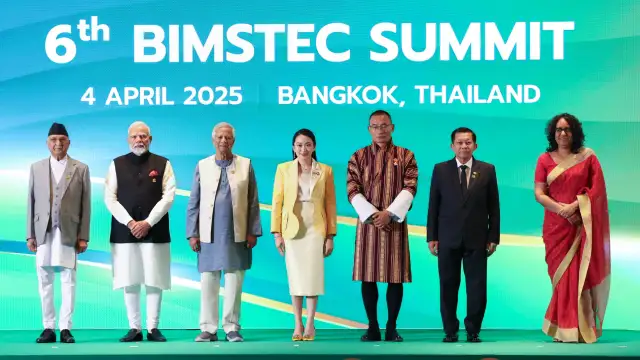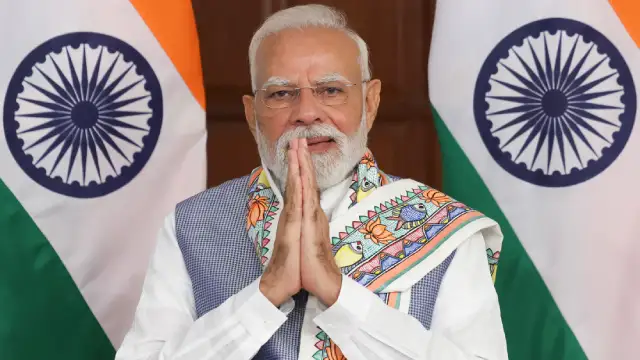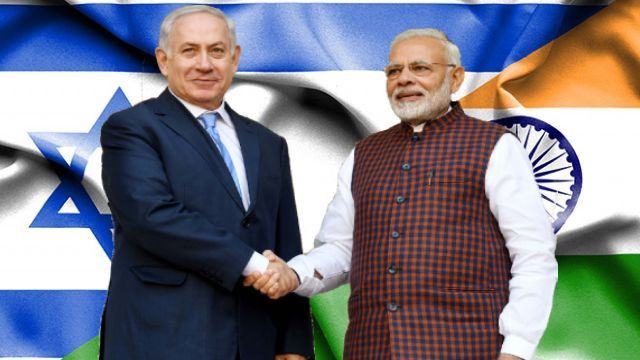Prime Minister Narendra Modi’s conspicuous silence on the Israeli aggression in Gaza and selective blaming of Hamas-led Palestinian opposition has jeopardised India’s geopolitical interests. Can India’s standpoint on the conflict be justified, especially its bitter opposition to Palestinian resistance?
Prime Minister Narendra Modi maintained his conspicuous silence on the Israeli aggression in Gaza during the G20 virtual summit on Wednesday, November 22nd. He neither held Israel as the culprit nor called for a ceasefire in Gaza. Rather, Modi used the occasion to hype New Delhi’s favourite topic – “terrorism”.
“We believe that terrorism is unacceptable to all of us”, Modi mentioned in his opening speech to blame the Hamas-led Operation Al-Aqsa Flood of October 7th for the ongoing bloodshed in Gaza.
“The death of civilians, wherever they may be, is condemnable”, he added paying lip service to the Palestinian victims without naming the perpetrator –Israel. Modi also asserted India’s official position that seeks a peaceful resolution of the conflict with the formation of an independent Palestinian state during his concluding remarks.
This fine balance between an aggressor, which is also a colonial occupation force, and the colonised, oppressed people has become a new mantra for Indian foreign policy, which was stated earlier by External Affairs Minister S Jaishankar, who attended the BRICS virtual summit on Tuesday instead of Modi.
In both forums, India officially blamed the Palestinian resistance against Israeli occupation forces and labelled it as “terrorism”, apparently in a bid to please the West, towards which India has been tilting despite its rhetoric on becoming the leading voice of the Global South.
However, the big question here is whether the Hamas attack on Israeli occupation forces on October 7th is tantamount to a “terrorist” attack. Can the Israeli narrative, backed by the West, also become the narrative of a Global South country like India?
What’s terrorism?
According to the United Nations Security Council (UNSC) resolution number 1566 of 2004, terrorism means “criminal acts, including against civilians, committed with the intent to cause death or serious bodily injury, or taking of hostages, with the purpose to provoke a state of terror in the general public or in a group of persons or particular persons, intimidate a population or compel a government or an international organization to do or to abstain from doing any act”.
If the Palestinian resistance is considered “terrorism” due to the alleged attacks against civilians and taking hostages from the occupied territories, Israel, according to the description above, also qualifies as a terrorist entity due to its incessant attacks against civilians, including hospitals.
Israel has bombed hospitals, killed children, destroyed houses and snapped the water and electricity supply to Gaza. Israel has denied Gaza any access to humanitarian aid from the international community by threatening to attack convoys passing through the Rafah crossing. It has also launched simultaneous attacks on neighbouring Lebanon and Syria, with sheer impunity.
In the last 48 days, according to the Palestinian Government Media Office (GMO), Israeli attacks killed 14,800 civilians in Gaza, including 6,000 children and 4,000 women.
The Israeli aggression in Gaza also didn’t spare the UN Relief and Works Agency (UNRWA) workers.
Even UN Secretary-General Antonio Guterres condemned the killing of the UNRWA workers in the Gaza Strip and Israel’s bombing of UNRWA schools where several displaced people sought refuge.
More than 50 journalists covering the horrendous war crimes have been killed throughout the new lease of Israeli aggression in Gaza.
Thousands of civilians are wounded and are succumbing due to lack of medical care, as the Israeli aggression in Gaza rendered them without any access to proper medical care. Even infants were killed as incubators stopped functioning due to lack of power.
The uninhibited massacre of innocent Palestinian civilians, including children, has raised questions over Israel’s intention. Does it want to punish the Palestinian resistance for its actions of October 7th, or does it want to collectively punish the Palestinian people?
If the description of terrorism is revisited, the current Israeli aggression in Gaza fits it. Its “criminal acts, including against civilians, committed with the intent to cause death or serious bodily injury”, or its intention “to provoke a state of terror in the general public”, or its violence that “intimidate a population or compel a government or an international organization”, make Israel a terrorist in this scenario.
However, it’s not mere rhetoric, even the data shows that the Israeli state has been carrying out a genocide in both Gaza and the West Bank, apparently with an intention of ethnic cleansing to expand the settler colonies.
Who is the terrorist?
Although Israel has failed to prove with evidence that Hamas fighters had killed civilians during the October 7th attack, if the attack itself is considered an act of terror, especially due to hostage-taking, there remains lacunae.
The Hamas attack wasn’t an unprovoked, fringe incident that had taken place in the occupied territories, rather, as declared by the Hamas leadership, it was in retaliation against the Israeli occupation and terror unleashed by the Zionist state on the people of the entrapped Gaza Strip.
According to the UN’s Office for the Coordination of Humanitarian Activities (UNOCHA), Israeli occupation forces had killed 6,621 Palestinians, including 1,490 children and 627 women, in the Gaza Strip and the West Bank between 2008 and September 2023, ie, before the current phase of violence.
In the same period, the Palestinian resistance had killed 311 Israelis, mostly settlers, including 25 children and 36 women.
The chart below shows the number of Palestinian and Israeli victims between 2008 and September 2023.
The data above shows that the Israeli occupation forces killed nearly 20 times more civilians than the Palestinian resistance.
In the meantime, while 156,227 Palestinians were injured in this period, Israel suffered only 6,338 injuries.
According to the chart given below, the Hamas-led Operation Al-Aqsa Flood was merely a very small-scale retaliation against the Israeli aggression in Gaza and the West Bank.
The Hamas attack had surprised Israel, but it couldn’t match the tenacity of the Israeli attacks and the massacres.
Hostage crisis
While Hamas is blamed for abducting Israeli settlers on October 7th, Israel has been blamed for abducting and imprisoning thousands of Palestinians since 1948.
Over 200 hostages were abducted by Hamas men on October 7th. In comparison to that, Israel, which illegally occupies Palestinian territories using brute force, has 7,800 Palestinian civilians under captivity.
While a ceasefire has been agreed upon by Hamas and Israel, to trade hostages, it’s unlikely that Israel will ever release all the Palestinian hostages. It continues to take hostages from the West Bank regularly and it’s alleged that the Israeli occupation forces dehumanise and assault the hostages in their torture chambers.
Is Palestinian resistance terrorism?
After the October 7th Hamas attack, Modi declared his support for Israel on social media. Following Modi, the officials of his far-right Bharatiya Janata Party (BJP) also joined the bandwagon to extend support to the Israeli aggression in Gaza and many of Modi’s fans jeered the genocide, which stirred an international condemnation.
While Modi had to reiterate India’s official position of supporting a peaceful resolution to the Palestine conflict after facing an imminent backlash over the BJP’s overenthusiastic support of the Israeli aggression in Gaza, the government and the mainstream media continued blaming Hamas for the humanitarian crisis. They projected Hamas as the catalyst of the violence and concealed the records of Israel’s human rights violations.
The Indian mainstream media, borrowing the West’s lexicon, calls the genocide in Gaza “the Israel-Hamas war”! They consciously ignore the fact that one party to the conflict is a nuclear power coloniser, and the other party is a colonised people. Rather, they equated them and labelled the genocide a war.
In their recent international interactions, Modi and Jaishankar said there is zero tolerance towards “terrorism”. However, what’s called “terrorism” by India, Israel and the West, is not applicable in the context of the Palestinian national liberation struggle.
According to the UN General Assembly (UNGA) resolution 47/82, which India supported, the colonised people are free to use whatever means they have at their disposal to achieve their national liberation.
The second point of the UNGA resolution 47/82 states:
“Reaffirms the legitimacy of the struggle of peoples for independence, territorial integrity, national unity and liberation from colonial domination, apartheid and foreign occupation, in all its forms and by all available means”.
This means, that the colonised people are free to use any form of struggle or any available means to achieve their “independence, territorial integrity, national unity and liberation from colonial domination, apartheid and foreign occupation”.
The Palestinian people are subject to “colonial domination, apartheid and foreign occupation”, therefore, their struggle in any form against it is legitimate according to the UN.
The third point of the UNGA resolution 47/82 states:
“Reaffirms also the inalienable right of the Palestinian people and all peoples under foreign occupation and colonial domination to self-determination, national independence, territorial integrity, national unity and sovereignty without foreign interference”.
This means, the Palestinian people, along with other colonised people, have an inalienable right to self-determination and national independence. They don’t have to depend on foreign interference or approval to exercise that right.
Unlike the Palestinian people, the Israelis don’t have the right to use violence against the colonised people. The UNGA resolution bars Israel from violating the human rights of the Palestinian people in the fifth point, which states:
The fifth point of the UNGA resolution 47/82 states:
“Calls upon Israel to refrain from the constant, deliberate violations of the fundamental rights of the Palestinian people, which constitute an obstacle to the achievement of self-determination and independence by the Palestinian people and the ongoing efforts towards comprehensive peace in the region”.
This makes clear when Israel violates the fundamental rights of the Palestinian people, specially creates an obstacle to their pursuit of achieving self-determination and independence, it violates the UNGA resolution and, therefore, its acts can be considered as an act of terrorism, as declared in the UNSC resolution 1566.
Quite interestingly, the UNGA resolution 47/82 states in the sixth point:
“Urges all States, the specialized agencies and organizations of the United Nations system, as well as other international organizations, to extend their support to the Palestinian people through its sole and legitimate representative, the Palestine Liberation Organization, in its struggle to regain its right to self-determination and independence in accordance with the Charter of the United Nations”.
As the Palestine Liberation Organization (PLO) is considered the sole legitimate representative of the Palestinian people, if it supports a particular military action, it becomes binding on the members to support that as well.
What did the PLO say on the Operation Al-Aqsa Flood?
The West Bank is ruled by the Fatah faction of the PLO under octogenarian Mahmoud Abbas’s leadership. As the head of the Palestinian Authority, Abbas stressed that the Palestinians have their right to defend themselves against “Israeli crimes and violations in Al-Aqsa Mosque compound and the Palestinian Territories”, soon after the Operation Al-Aqsa Flood.
Palestinian official news agency WAFA reported that Abbas had instructed the Palestinian Authority officials to provide the Palestinians with everything necessary “to strengthen the steadfastness of the Palestinians in the face of crimes committed by the Israeli occupation and settler gangs”.
Abbas even boycotted a meeting with US President Joe Biden in Jordan’s capital Amman following Israeli aggression in Gaza. The PLO, which had been trying to balance the Palestinian people’s aspirations and the pressure exerted by the Israeli occupation forces, didn’t take the side of Tel Aviv following Operation Al-Aqsa Flood, which exhibits that it stands with the resistance and doesn’t oppose it.
In this case, according to the sixth point of the UNGA resolution 47/82, the Hamas attack on Israel, supported by the PLO, appears to be a legitimate action of resistance against the colonial occupiers.
By carrying out a genocide in Gaza, to terrorise the civilians and force the Palestinian Authority and the elected representatives of Hamas in the entrapped Gaza enclave to surrender, Israel itself has committed an act of terrorism.
Then, in view of the above, how can the Indian government, which has reiterated its commitment to the two-state solution, oppose “terrorism” selectively, sparing the genocidal actions of Israel? How can it overlook the Israeli aggression in Gaza continuing for over five decades and the genocide that has killed over 14,000 people in over 47 days?
Can India oppose the Israeli aggression in Gaza?
Although Modi and Jaishankar have condemned the Israeli aggression in Gaza, without naming the perpetrator of the crime, it’s unlikely that New Delhi will take any strong stand against Tel Aviv in the current situation.
Under the Modi government’s aegis, the Indian foreign policy has been shifting rightwards. Modi has been using a façade of multilateralism and praises for multipolarity, but in reality, his government attempts to serve the interests of the West, especially the US. It has been taking the side of the West explicitly in the geopolitically polarised world.
To farther the BJP’s far-right Hindutva nationalist narrative at home and for the sake of his government’s pro-western foreign policy to help the business interests of corporate sponsors of his party, Modi must ride on the shoulders of the US-led imperialist West and Zionist Israeli occupation.
Hence, in international forums like G20 and BRICS, Modi and Jaishankar could neither condemn the ongoing Israeli aggression in Gaza nor call out Tel Aviv for its crimes.
With such an attitude, it’s clear that India’s long-term geopolitical interests will be mortgaged to the US’s whimsical fancies. It will affect India’s growth prospects and keep it trapped with the losing side in the global geopolitical battle.
Moreover, the agenda of multipolarity will also suffer due to New Delhi’s vacillating stand, which is mostly diametrically opposite to that of the Global South.
The US’s support for the far-right forces in India will be imperative for Modi to return to power in 2024, riding on the waves of jingoism and Islamophobia. Due to this support, Modi and his cohorts will take all possible steps to continue supporting Israeli aggression in Gaza. But can this strategy guarantee Modi trouble-free foreign relations in the utmost tumultuous era of geopolitical upheavals?
Join our channels on Telegram and WhatsApp to receive geopolitical updates, videos and more.

